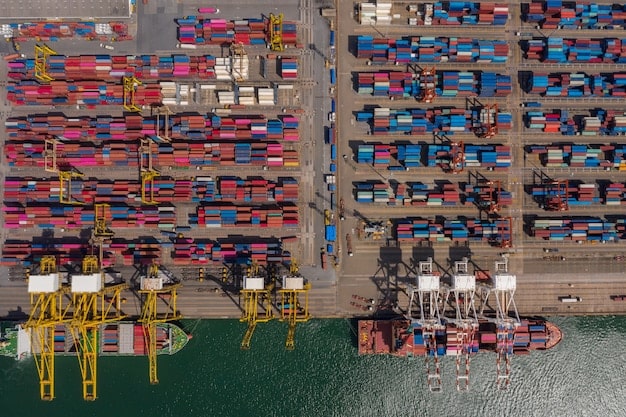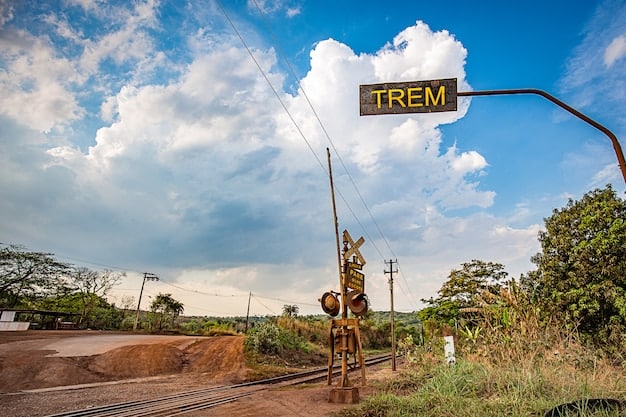US Response to China’s Growing Influence in Africa: Strategies & Challenges

The US is likely to respond to China’s growing influence in Africa with a multifaceted approach, including increased diplomatic engagement, strategic investments, and strengthened security partnerships to counter China’s economic and political footprint on the continent.
The rise of China as a global power has significantly impacted the geopolitical landscape, and nowhere is this more evident than in Africa. As China deepens its economic and political ties across the continent, the question of how will the US respond to the growing influence of China in Africa? becomes increasingly critical. The US approach will likely involve a complex interplay of diplomatic, economic, and security strategies.
Understanding China’s Influence in Africa
China’s presence in Africa has grown exponentially over the past two decades. This influence spans various sectors, from infrastructure development to trade and investment, reshaping the continent’s economic and political dynamics. Understanding the scope and nature of this influence is crucial for anticipating the US response.
Economic Engagement: Trade and Investment
China has become Africa’s largest trading partner, with trade volumes reaching hundreds of billions of dollars annually. This economic engagement includes massive infrastructure projects, resource extraction, and investments in various sectors.
Infrastructure and Development
Chinese companies have been instrumental in building roads, railways, ports, and other critical infrastructure across Africa. These projects often come with concessional loans and financing agreements, further solidifying China’s economic footprint.
- Belt and Road Initiative (BRI): A global initiative aimed at enhancing connectivity and cooperation, with numerous African countries participating.
- Financing Models: Chinese financing often involves resource-backed loans, where repayment is tied to natural resource exports.
- Impact on African Economies: While these projects boost infrastructure, concerns exist about debt sustainability and long-term economic dependence.

China’s engagement also extends to political influence, with Beijing cultivating strong relationships with African governments. This includes diplomatic support, training programs for officials, and military cooperation.
The US Perspective: Interests and Concerns
The US views China’s growing influence in Africa through a lens of strategic competition. While acknowledging the positive aspects of economic development, Washington is concerned about the potential challenges to its own interests and values.
Strategic Competition
The US sees the increasing Chinese presence in Africa as a challenge to its own geopolitical influence. This competition extends to trade, investment, and security, with implications for regional stability and international norms.
Democracy and Governance
The US often emphasizes the importance of democratic values, human rights, and good governance. Concerns arise when Chinese engagement appears to prioritize economic interests over these principles.
- Debt Sustainability: The US is concerned about the potential for African countries to become over-indebted to China, leading to economic vulnerability.
- Transparency and Accountability: Washington advocates for transparent and accountable governance in Africa, contrasting this with concerns about corruption and lack of transparency in some Chinese projects.
- Security Implications: The US keeps a close watch on China’s military presence in Africa, including arms sales, training programs, and naval activities.
Washington’s response will likely involve a comprehensive strategy that addresses both the opportunities and challenges presented by China’s influence in Africa. This includes strengthening partnerships with African countries, promoting sustainable development, and countering perceived threats to US interests.

Potential US Responses: A Multifaceted Approach
Given the complexity of the situation, the US response to China’s growing influence in Africa is likely to be multifaceted. This approach will encompass diplomatic engagement, economic initiatives, security partnerships, and soft power strategies.
Diplomatic Engagement
The US will likely increase its diplomatic efforts to strengthen relationships with African countries. This includes high-level visits, policy dialogues, and support for regional organizations.
Economic Initiatives
Washington can offer alternative economic partnerships and development assistance to African countries. These initiatives could focus on promoting sustainable development, inclusive growth, and economic diversification.
- Trade Agreements: Negotiating trade agreements that provide preferential access to US markets for African products.
- Investment Promotion: Encouraging US companies to invest in Africa, particularly in sectors that align with development goals.
- Development Assistance: Providing financial and technical assistance to support education, healthcare, and infrastructure development.
Security cooperation is another crucial dimension of the US response. This involves providing training, equipment, and logistical support to African militaries to enhance their capacity to address security challenges.
Soft Power and Cultural Exchange
The US can leverage its soft power to promote its values and build positive relationships with African populations. This includes cultural exchange programs, educational scholarships, and support for civil society initiatives.
Challenges and Opportunities for US Strategy
Implementing an effective strategy to counter China’s influence in Africa presents both challenges and opportunities for the US. Addressing these factors will be crucial for success.
Balancing Competition and Cooperation
The US needs to strike a balance between competing with China and cooperating on shared interests, such as combating climate change, addressing global health challenges, and promoting regional stability.
Working with African Partners
The US must work closely with African countries, respecting their sovereignty and priorities. This involves listening to their needs and providing support that aligns with their development goals.
- Capacity Building: Investing in education and training programs to develop a skilled workforce in Africa.
- Promoting Good Governance: Supporting democratic institutions, rule of law, and anti-corruption efforts.
- Addressing Climate Change: Helping African countries adapt to climate change and transition to sustainable energy sources.
Effectively communicating its message and values is also essential for the US. This involves engaging with African media, civil society, and the general public to promote a positive image of the US and its policies.
The Role of International Partnerships
Addressing the challenges posed by China’s growing influence in Africa requires a collaborative approach involving international partners. This includes coordinating with like-minded countries and multilateral organizations.
Coordination with Allies
The US can work with European countries, Japan, and other allies to coordinate their strategies and investments in Africa. This ensures a more unified and effective approach.
Multilateral Institutions
Engaging with multilateral organizations, such as the African Union, the United Nations, and the World Bank, is also crucial. These institutions play a key role in promoting development, peace, and security in Africa.
- Joint Development Projects: Partnering with other countries and organizations to fund and implement infrastructure and development projects.
- Policy Coordination: Aligning policies on trade, investment, and development assistance to ensure a coherent and effective approach.
- Information Sharing: Sharing information and analysis on China’s activities in Africa to inform decision-making.
By working together with its allies and international partners, the US can leverage its collective resources and expertise to address the challenges posed by China’s growing influence in Africa, promoting sustainable development and shared prosperity.
Future Outlook: Implications for Africa and the World
The US response to China’s growing influence in Africa will have significant implications for the continent and the world. The outcome of this strategic competition will shape the future of development, security, and geopolitics in the region.
Economic Development
The competition between the US and China will likely lead to increased investment and development assistance for Africa. This could result in accelerated economic growth, improved infrastructure, and greater opportunities for African countries.
Geopolitical Balance
The outcome could also influence the geopolitical balance of power in Africa and beyond. It is vital that the US response is well-calibrated and effective in promoting its interests while also supporting the development and stability of the continent.
- Increased Investment: Competition may drive more investment from both the US and China, benefiting African economies.
- Innovation and Technology Transfer: The need to stay competitive could spur innovation and technological advancements in African countries.
- Enhanced Infrastructure: Efforts to outdo each other may lead to better infrastructure development across Africa.
The future will depend on how effectively the US can engage with African countries, promote its values, and offer sustainable and beneficial partnerships. The question of how will the US respond to the growing influence of China in Africa? remains a crucial one, with implications that extend far beyond the continent itself.
| Key Point | Brief Description |
|---|---|
| 🌍 Diplomatic Engagement | Strengthening relationships with African countries through high-level visits and policy dialogues. |
| 💰 Economic Initiatives | Offering alternative economic partnerships to promote sustainable and inclusive growth. |
| 🛡️ Security Cooperation | Enhancing the capacity of African militaries through training, equipment, and logistical support. |
| 🤝 International Partnerships | Coordinating with allies and engaging with multilateral organizations for a unified approach. |
Frequently Asked Questions (FAQ)
▼
China’s influence spans economic, political, and security domains, including trade, infrastructure, resource extraction, diplomatic relations, and arms sales.
▼
The US is concerned about strategic competition, debt sustainability, transparency, good governance, and the potential for long-term economic dependence in African countries.
▼
Increased high-level visits, policy dialogues, and support for regional organizations will likely be central to US diplomatic efforts to strengthen relationships.
▼
The US could promote trade agreements, investment, and financial and technical assistance for education, healthcare, and infrastructure.
▼
Coordination with allies and engagement with multilateral organizations are vital for efficiently using collective resources to address China’s growing influence.
Conclusion
In summary, the unfolding interaction between the US and China in Africa presents a complex web of strategic considerations. The US response to China’s growing influence will likely involve a blend of diplomatic, economic, and security measures, aimed at fostering sustainable development and safeguarding its interests while ensuring cooperation on global concerns.





